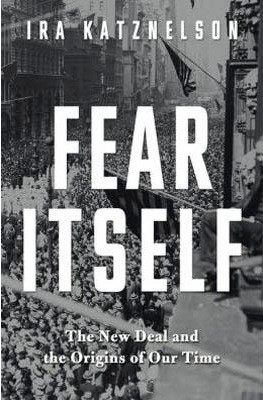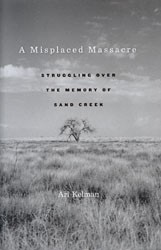Winners of the 2014 Bancroft Prize Announced

Fear Itself: The New Deal and the Origins of Our Time by Ira Katznelson (Liveright Publishing Corporation / W.W. Norton & Company, 2013) and A Misplaced Massacre: Struggling over the Memory of Sand Creek by Ari Kelman (Harvard University Press, 2013).
Fear Itself: The New Deal and the Origins of Our Time offers a fresh interpretation of a much-studied topic, exposing the racial politics than enabled Franklin Roosevelt to secure Congressional support for many New Deal measures. Katznelson traces the United States from a Progressive Era nation, still united by many widely shared ideals of the common good, to a balkanized, procedurally competitive democratic state in which seemingly neutral rules of political engagement masked the competitive edge enjoyed by certain groups.
A Misplaced Massacre grapples with the politics of historical memory and memorializing in Sand Creek, Colorado, the site of an 1864 massacre of Cheyennes and Arapahos. Kelman deals evenhandedly with the fraught politics of inconclusive and contradictory archival records, the goals of National Park memorialists, the claims of property owners, and Native American efforts to have a historic injustice marked and recalled without perpetrating further violation of the spirits of murdered ancestors.
The Bancroft Prize is awarded annually by the trustees of Columbia University. Winners are judged in terms of the scope, significance, depth of research, and richness of interpretation they present in the areas of American history and diplomacy. There were 190 books nominated that were considered for the 2014 prize.

Columbia Provost John H. Coatsworth will present the awards at the Bancroft Prize dinner next month, hosted by the department of history and Columbia University Libraries. The Bancroft Prize, which includes an award of $10,000 to each author, is administered by University Librarian and Vice President for Information Services, James G. Neal.
“Historical scholarship with innovative and rigorous examinations and exciting boundary challenges, as evidenced by the content and scope of this year's Bancroft Prize winners, is so worthy of our celebration and recognition. We applaud the excellence in research, writing and thought demonstrated by the two works selected this year,” Neal said.
Ira Katznelson is Columbia University’s Ruggles Professor of Political Science and History, and president of the Social Science Research Council. A graduate of Columbia College, he holds a Ph.D. in History from Cambridge University. His books include Fear Itself: The New Deal and the Origins of Our Time (2013), Liberal Beginnings: A Republic for the Moderns (2008; co-authored with Andreas Kalyvas), When Affirmative Action Was White: An Untold History of Racial Inequality in Twentieth-Century America (2005), and Desolation and Enlightenment: Political Knowledge After Total War, Totalitarianism, and the Holocaust (2003). He was president of the American Political Science Association in 2005-2006.
Ari Kelman is a Professor of History at the University of California, Davis. In addition to A Misplaced Massacre, he is the author of A River and Its City: The Nature of Landscape in New Orleans. Kelman’s essays have appeared in Slate, The Christian Science Monitor, The Nation, The Times Literary Supplement, and The Journal of American History, among others. He has received numerous grants and fellowships, including ones from the National Endowment for the Humanities and the Huntington Library. He is now working on two books, Battle Lines: A Graphic History of the Civil War and For Liberty and Empire: How the Civil War Bled into the Indian Wars.
The Bancroft Prize was established at Columbia University in 1948 with a bequest from Frederic Bancroft, a preeminent historian, librarian, author, and Columbia University lecturer. It is considered one of the most distinguished academic awards in the field of history.
Columbia University Libraries is one of the top five academic research library systems in North America. The collections include over 13 million volumes, over 160,000 journals and serials, as well as extensive electronic resources, manuscripts, rare books, microforms, maps, and graphic and audio-visual materials. The Libraries employs more than 400 professional and support staff and hosts over 4.7 million visitors each year. The website of the Libraries is the gateway to its services and resources: library.columbia.edu.